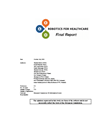 For the last two decades the European Commission (EC), and in particular the Directorate General Information Society and Media, has been strongly supporting the application of Information and Communication Technologies (ICT) in healthcare. ICT is an enabling technology which can provide various solutions in the healthcare sector, ranging from electronic patient records and health information networks to intelligent prosthetics and robotised surgery. The EC funded the present study with the aim to investigate the potential of robotics in healthcare.
For the last two decades the European Commission (EC), and in particular the Directorate General Information Society and Media, has been strongly supporting the application of Information and Communication Technologies (ICT) in healthcare. ICT is an enabling technology which can provide various solutions in the healthcare sector, ranging from electronic patient records and health information networks to intelligent prosthetics and robotised surgery. The EC funded the present study with the aim to investigate the potential of robotics in healthcare.
Robotics for healthcare is an emerging field which is expected to grow in the face of demographic change (ageing), expected shortages of healthcare personnel, calls for improving quality of life for the elderly and disabled, and the need for even higher quality care, for example high precision surgery. All these factors stimulate innovation in the domain of Robotics for Healthcare. Several programs and networks dedicated to research on robotics are already focusing part of their efforts on applications in healthcare.
The main aim of this study is to provide key research policy recommendations for the application of robotics in healthcare. Another objective of the study is to raise awareness about these important new developments among a wider audience. To this extent, a roadmap of promising applications of robotics in healthcare and associated R&D was developed, taking into account the state of the art as well as short and long-term future possibilities with a time horizon ending in 2025.
Download Robotics for Healthcare Final Report (.pdf, 2.980 KB).
Download from the eHealthNews.EU Portal's mirror: Robotics for Healthcare Final Report (.pdf, 2.980 KB).
For further information:
ICT for Health
European Commission - Information society and Media DG
Office: BU31 06/73 B-1049 Brussels
Tel: +32 2 296 41 94
Fax: +32 2 296 01 81
http://europa.eu/information_society/eHealth